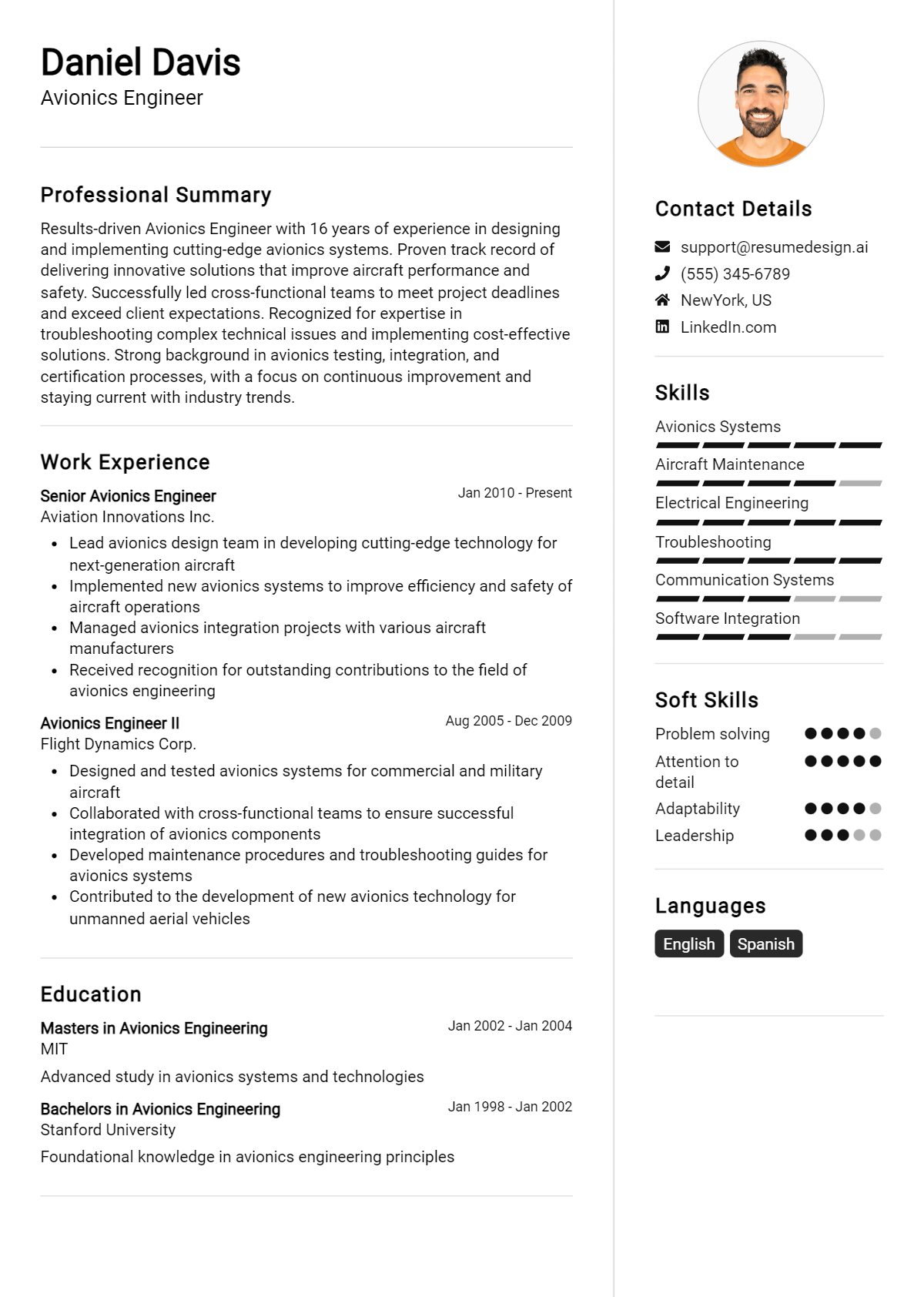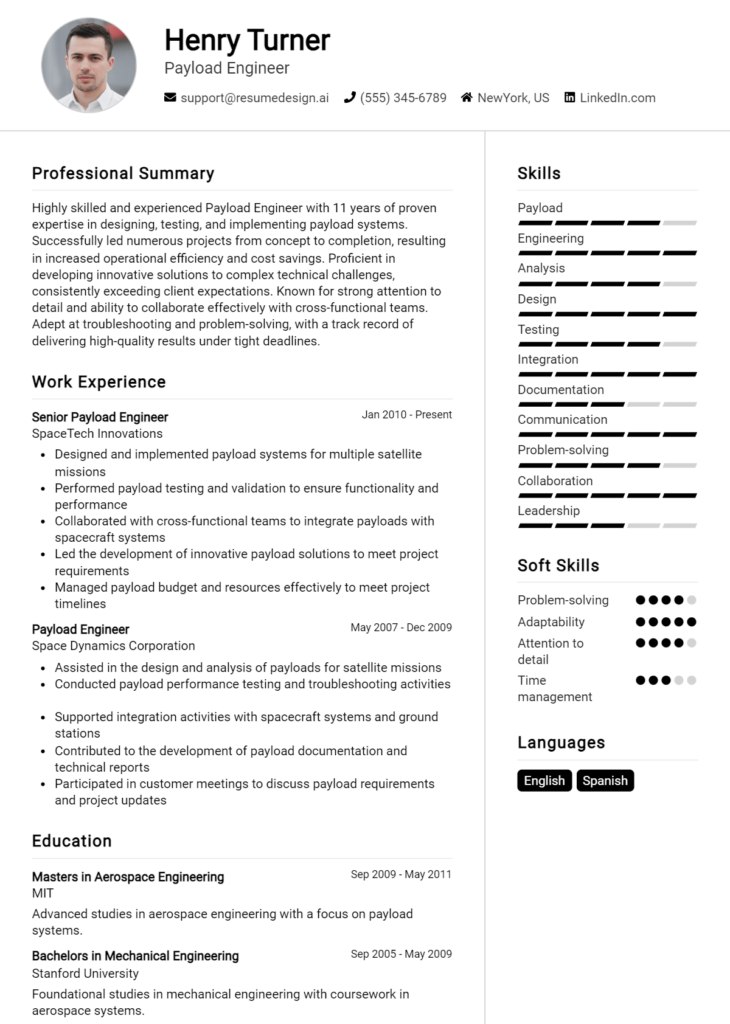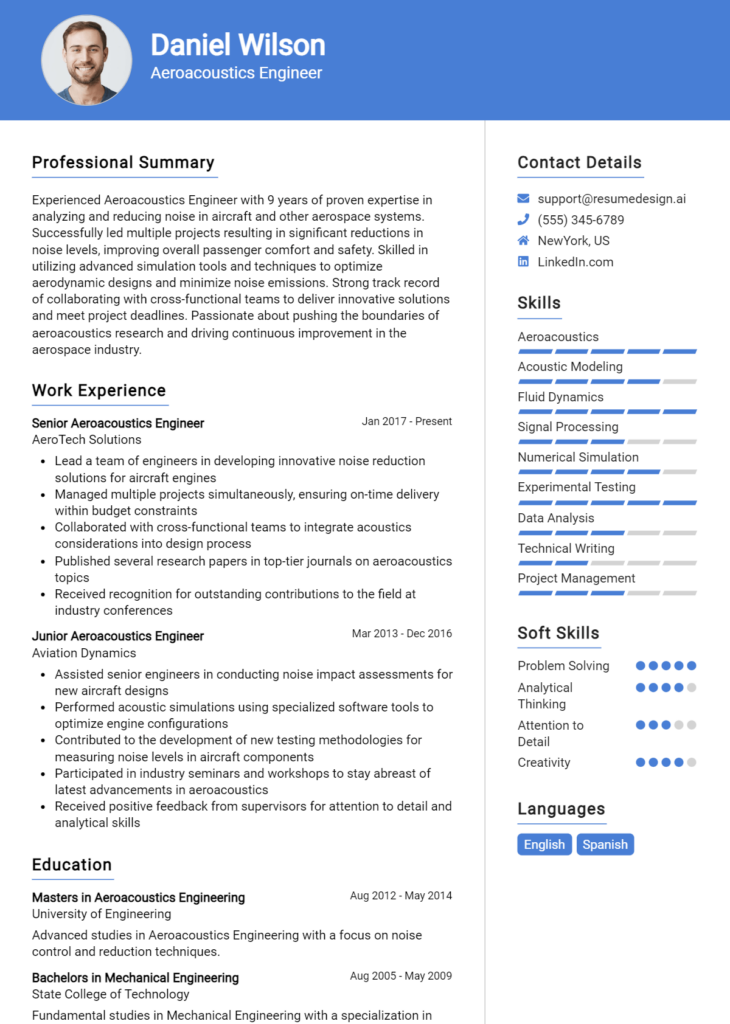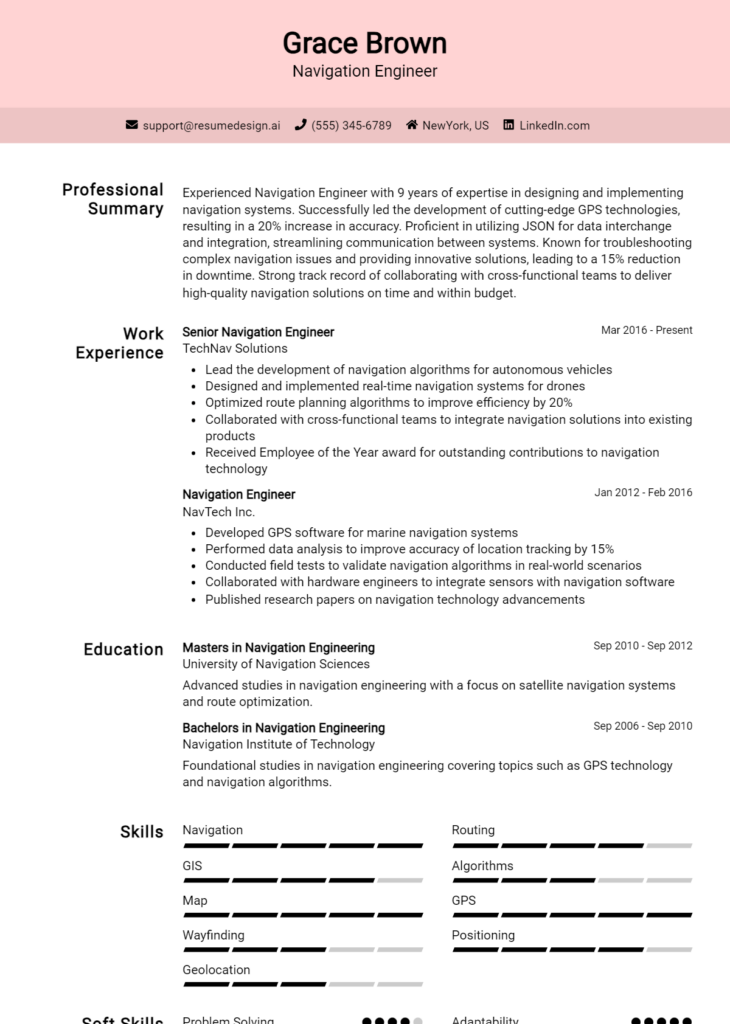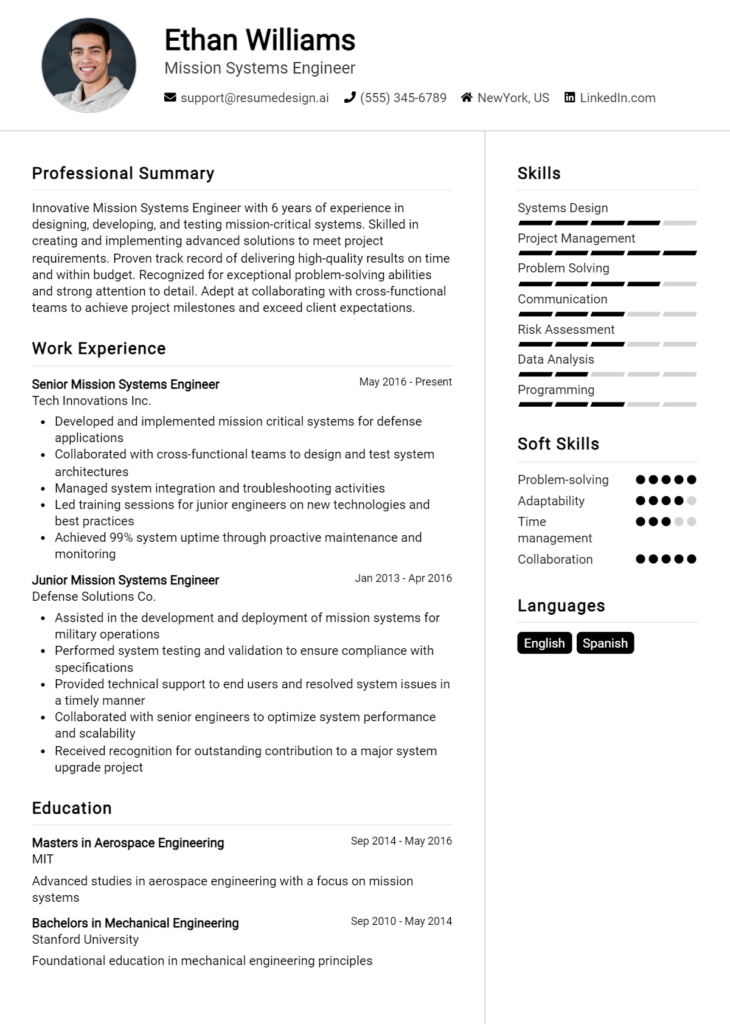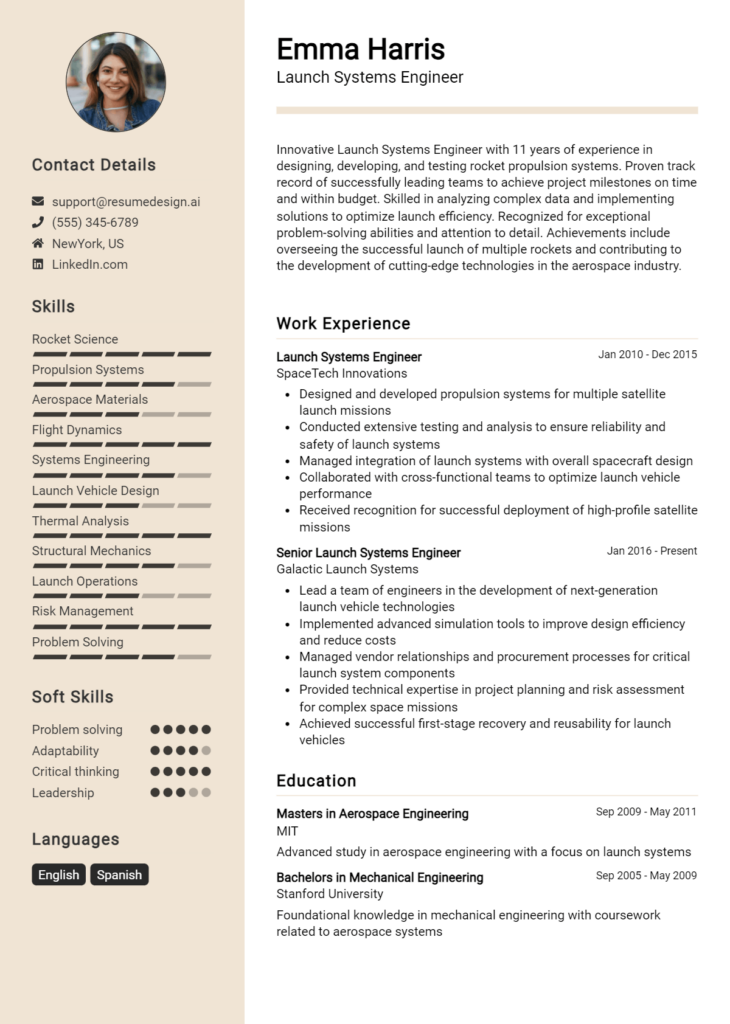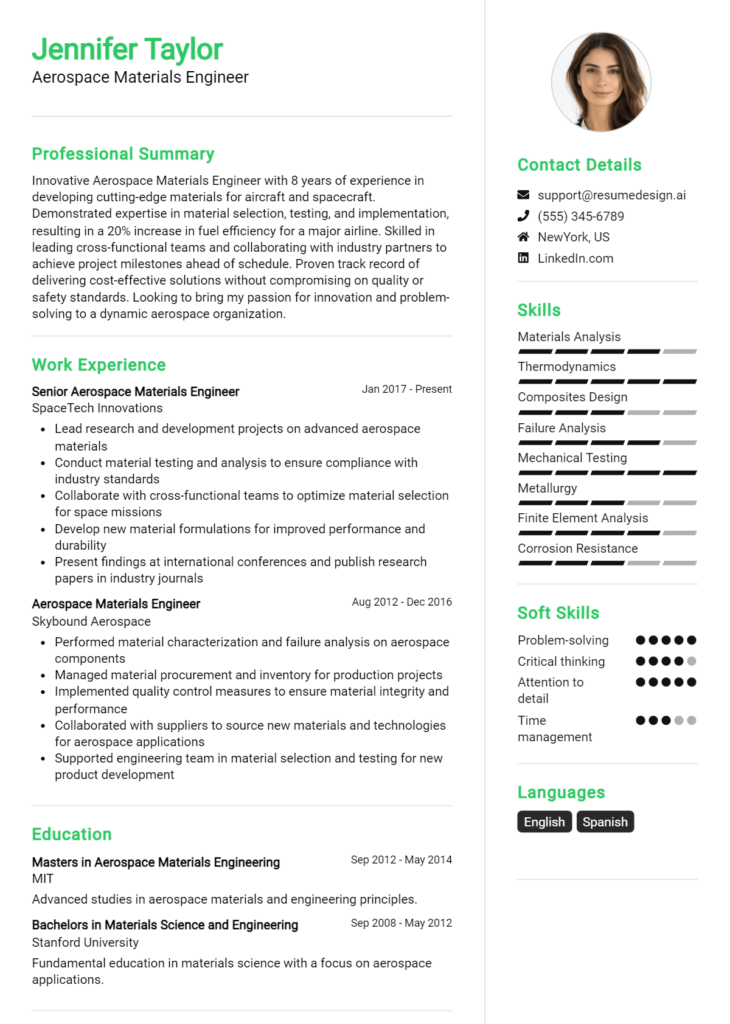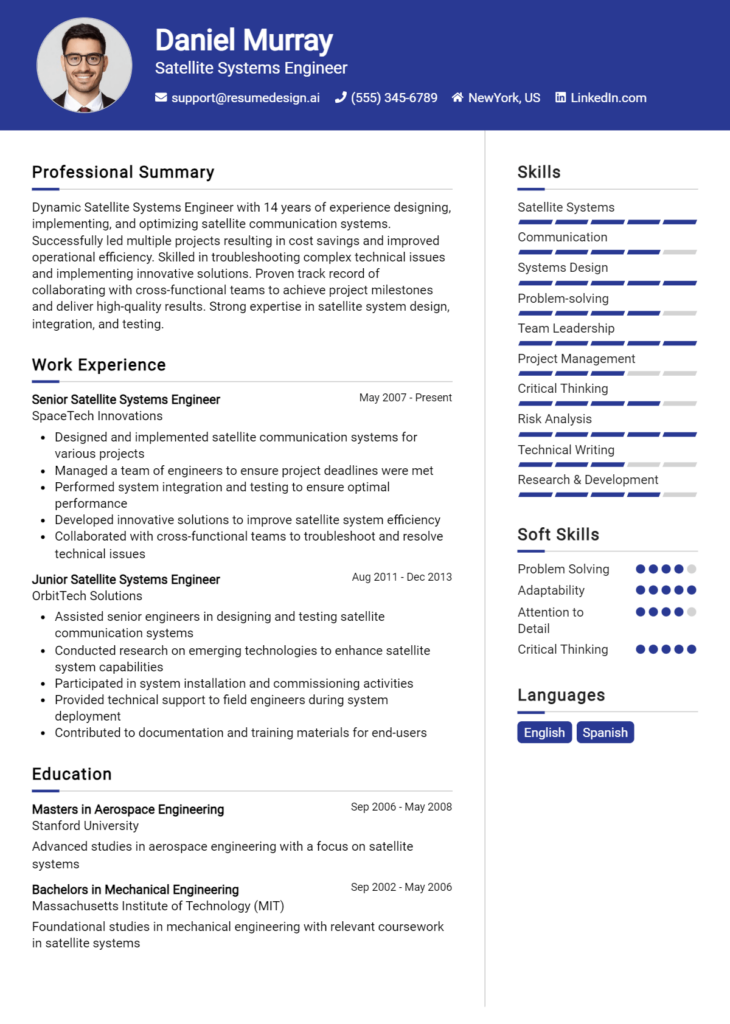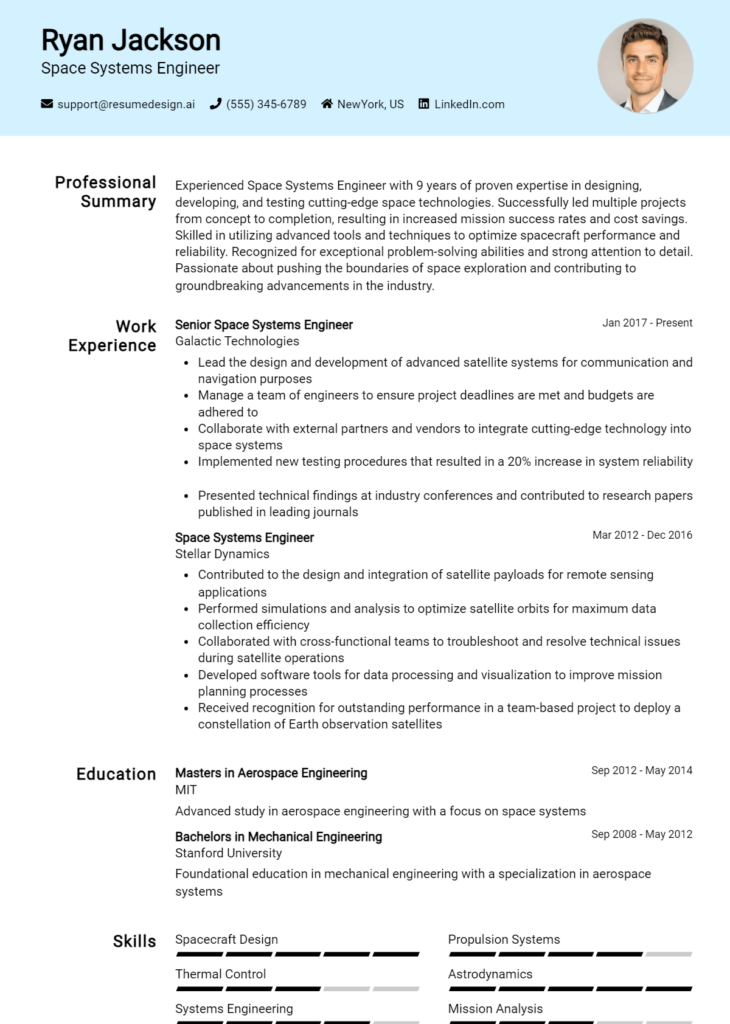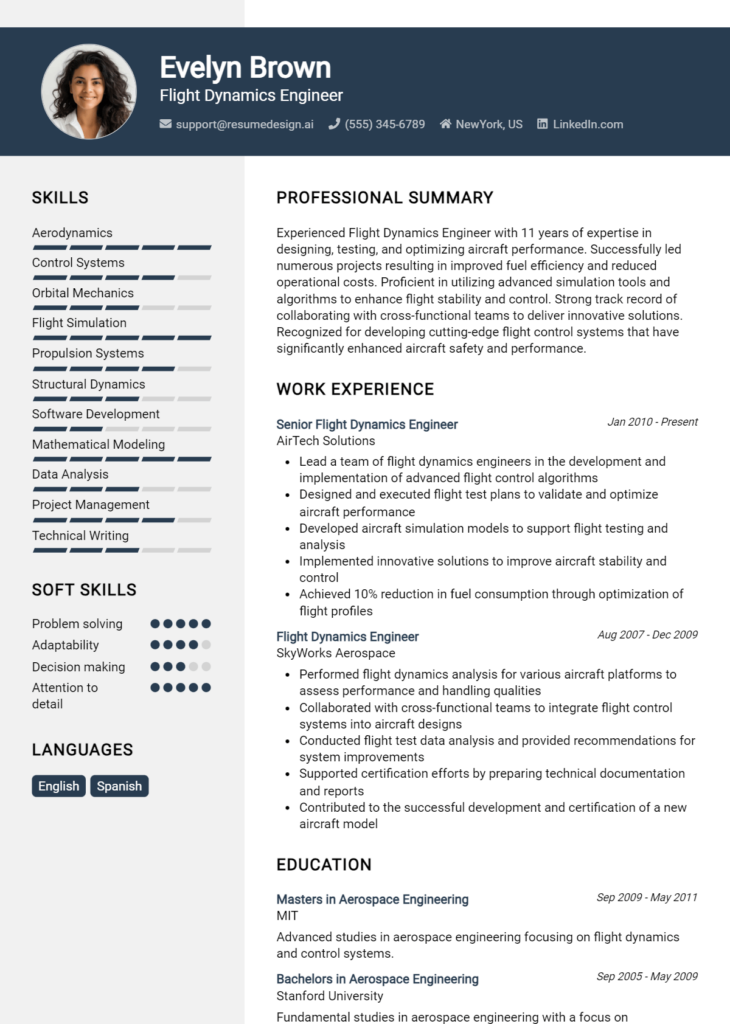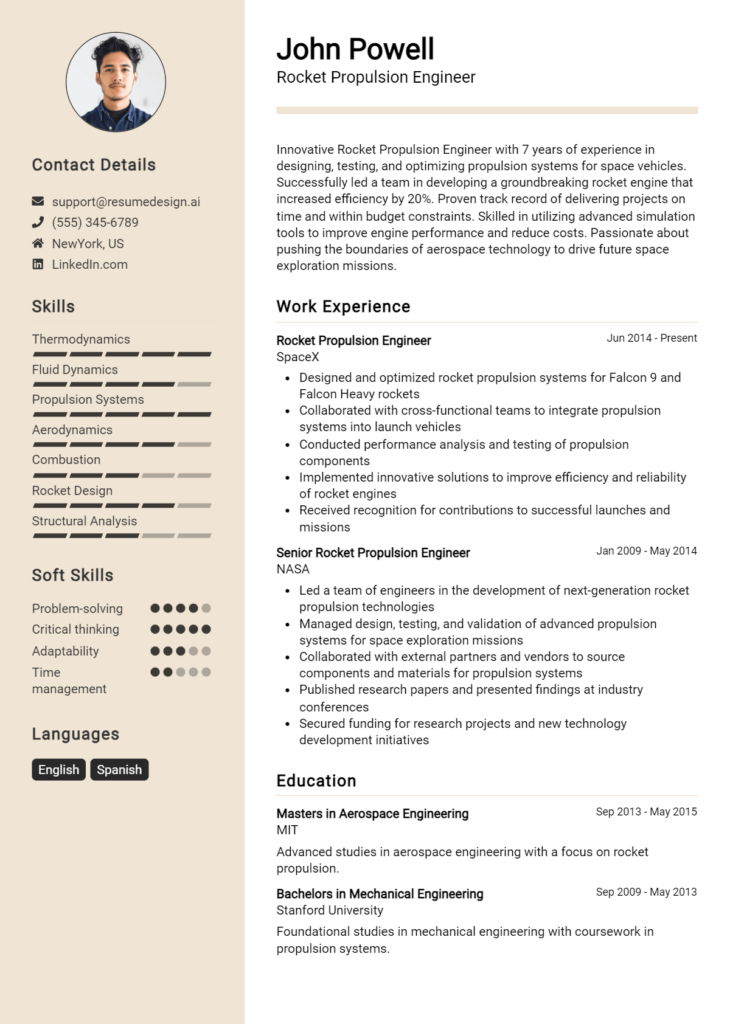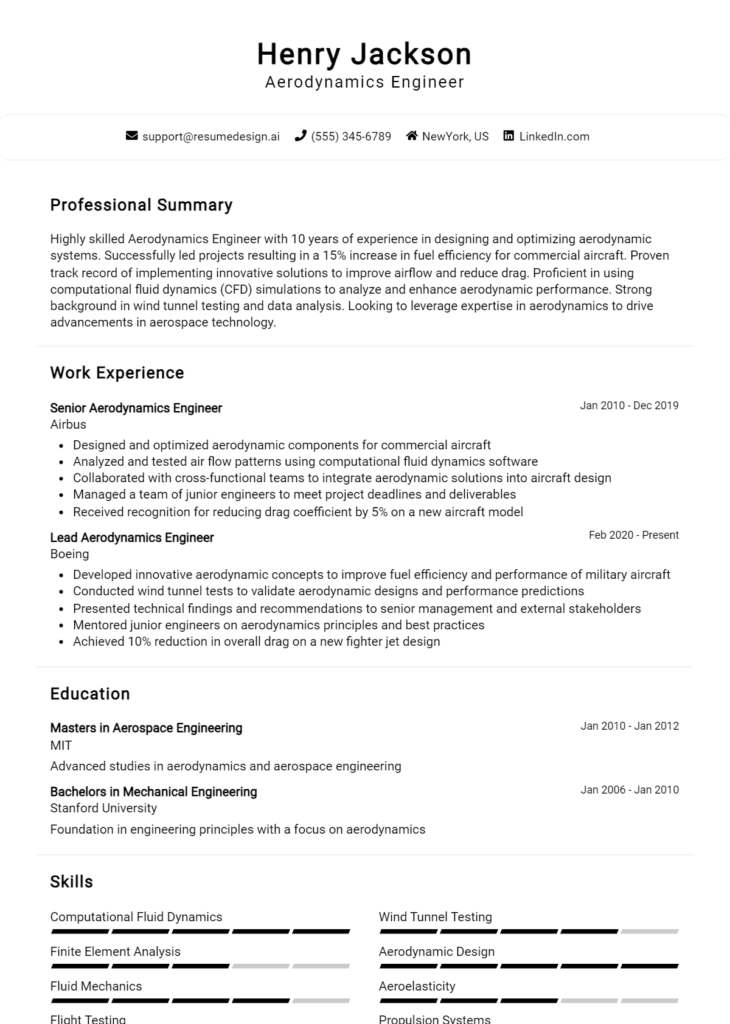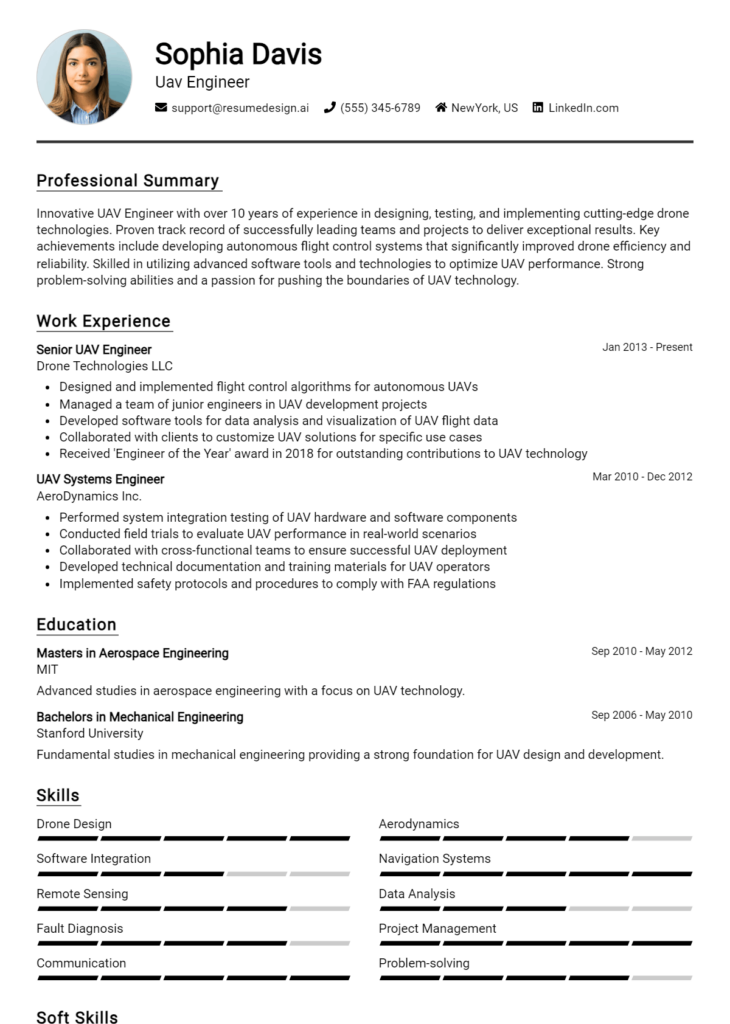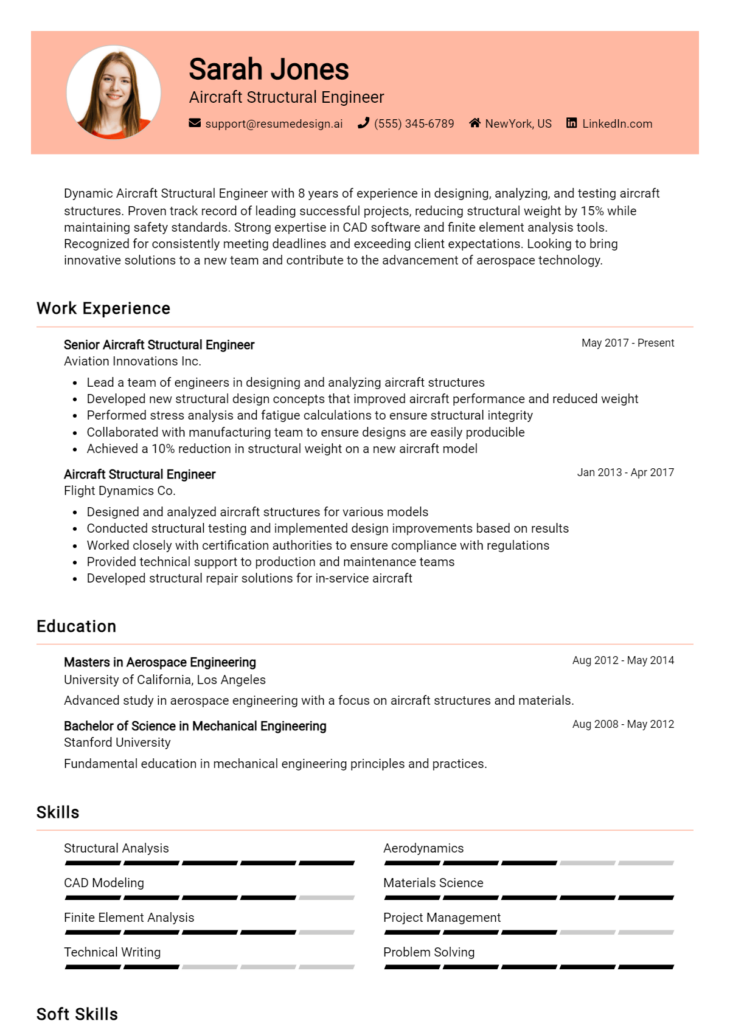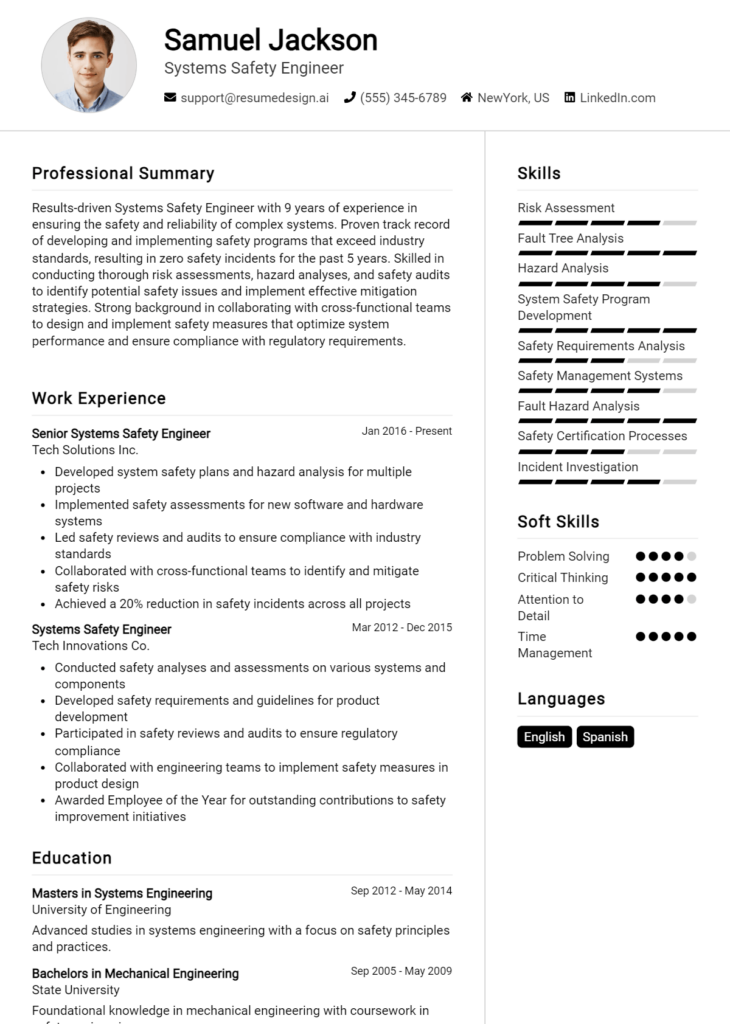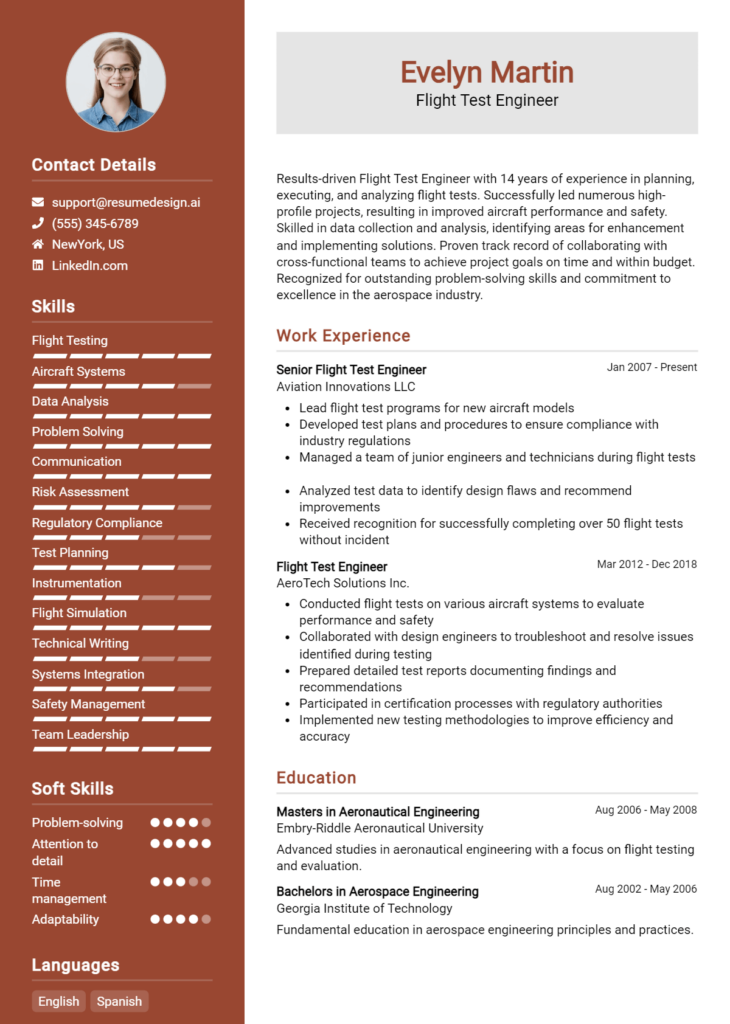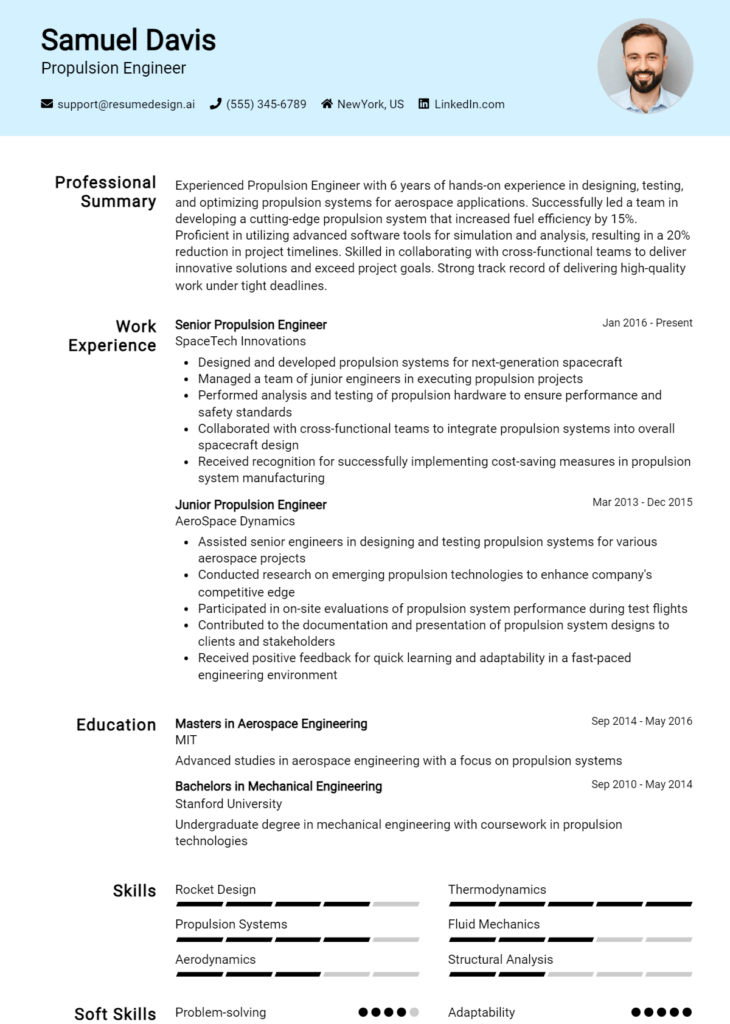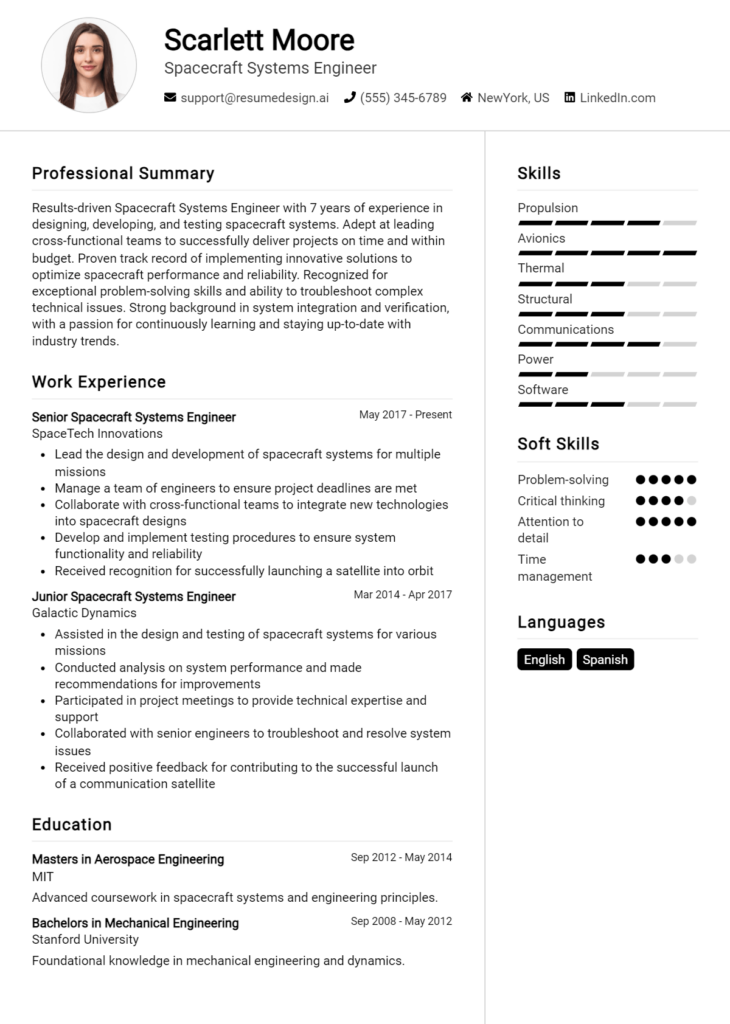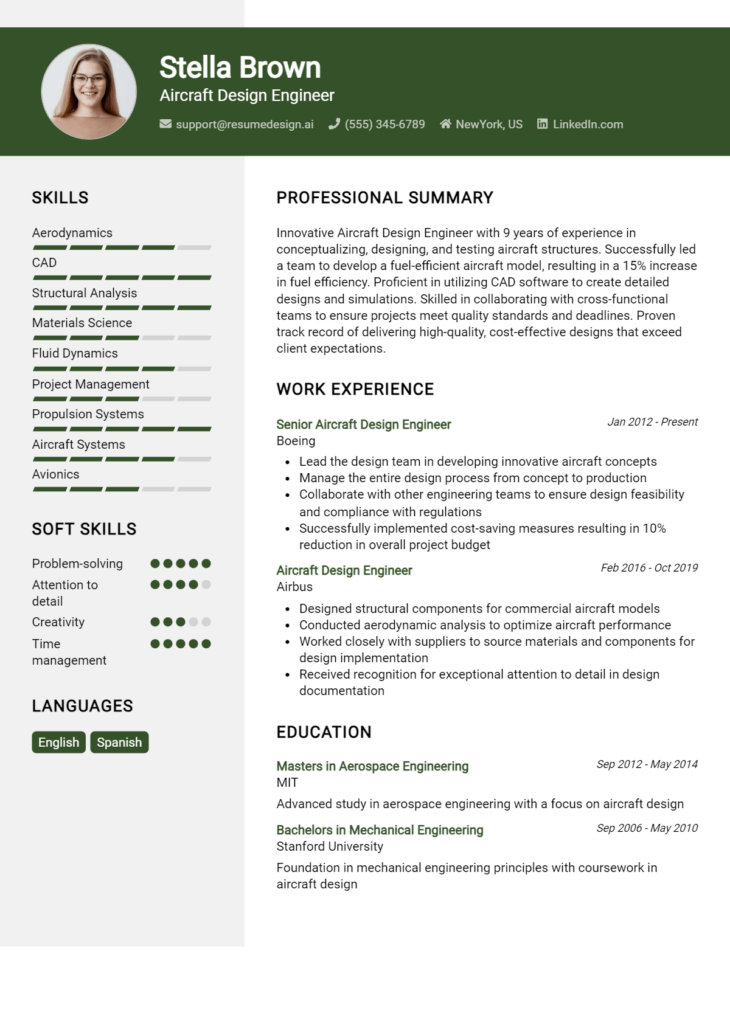Avionics Engineer Core Responsibilities
Avionics Engineers play a crucial role in the aviation industry, focusing on the development, testing, and maintenance of aircraft electronic systems. Their core responsibilities include designing avionics systems, ensuring compliance with safety regulations, and collaborating across departments such as engineering, manufacturing, and quality assurance. Essential skills encompass strong technical knowledge, operational understanding, and advanced problem-solving capabilities. These competencies are vital for achieving organizational goals, and a well-structured resume can effectively highlight these qualifications to prospective employers.
Common Responsibilities Listed on Avionics Engineer Resume
- Design and develop avionics systems for aircraft.
- Conduct testing and troubleshooting of electronic systems.
- Ensure compliance with aviation regulations and standards.
- Collaborate with cross-functional teams on projects.
- Analyze system failures and implement corrective actions.
- Provide technical support and guidance to other departments.
- Document design processes and maintain technical records.
- Assist in the integration of new technologies into existing systems.
- Perform risk assessments and reliability analyses.
- Stay updated on industry advancements and emerging technologies.
- Prepare and present reports on project progress and findings.
High-Level Resume Tips for Avionics Engineer Professionals
In the competitive field of avionics engineering, a well-crafted resume is crucial for making a strong first impression on potential employers. A resume serves as the candidate's personal marketing tool, showcasing not just their technical skills, but also their achievements and contributions to previous projects. For avionics engineers, where precision and expertise are paramount, it's essential that the resume reflects both a deep understanding of the industry and a track record of successful implementation. This guide will provide practical and actionable resume tips specifically tailored for avionics engineer professionals, helping you stand out in a crowded job market.
Top Resume Tips for Avionics Engineer Professionals
- Tailor your resume to each job description, highlighting the skills and experiences that align with the specific requirements of the position.
- Begin with a strong summary statement that captures your key qualifications and sets the tone for the rest of the resume.
- Showcase relevant experience, particularly in avionics systems design, integration, testing, and troubleshooting.
- Quantify your achievements whenever possible, using metrics to demonstrate the impact of your work, such as improved efficiency or reduced costs.
- Highlight industry-specific skills, such as familiarity with avionics software, regulatory compliance, and safety standards.
- Include certifications and training relevant to avionics engineering, such as DO-178C or AS9100 standards.
- Utilize action verbs to describe your responsibilities and accomplishments, making your resume more dynamic and engaging.
- Incorporate keywords from the job listing to pass through applicant tracking systems and catch the attention of hiring managers.
- Keep your resume concise, ideally one page for less experienced candidates or up to two pages for those with extensive experience.
- Proofread thoroughly to eliminate any errors, ensuring that your resume reflects the attention to detail that is essential in the field of avionics.
By implementing these tips, avionics engineer professionals can significantly enhance their resumes, increasing their chances of landing a job in this specialized field. A polished and targeted resume not only showcases your qualifications but also demonstrates your commitment to professionalism and excellence, making you a more attractive candidate to potential employers.
Writing an Exceptional Avionics Engineer Resume Summary
In the competitive field of avionics engineering, an exceptional resume summary is crucial for making a strong first impression on hiring managers. This brief introductory paragraph serves as a snapshot of your professional identity, allowing you to quickly showcase your key skills, relevant experience, and notable accomplishments that align with the job role. A well-crafted resume summary should be concise yet impactful, effectively capturing the attention of recruiters and prompting them to delve further into your qualifications. Tailoring this summary to the specific position you are applying for increases its relevance and can significantly enhance your chances of landing an interview.
Best Practices for Writing a Avionics Engineer Resume Summary
- Quantify achievements to demonstrate measurable impact.
- Focus on relevant skills that match the job description.
- Use industry-specific terminology to highlight expertise.
- Keep it concise—aim for 3-5 sentences.
- Highlight certifications or special training relevant to avionics.
- Use action verbs to convey confidence and proactivity.
- Tailor the summary for each application to reflect the specific role.
- Showcase problem-solving abilities or innovative solutions you've implemented.
Example Avionics Engineer Resume Summaries
Strong Resume Summaries
Detail-oriented Avionics Engineer with over 7 years of experience in systems integration and testing, successfully improving aircraft communication systems by 30%, ensuring compliance with FAA regulations. Proven ability to lead cross-functional teams and manage complex projects under tight deadlines.
Results-driven professional with a solid background in avionics design and maintenance, having reduced system failures by 25% through meticulous troubleshooting and innovative redesigns. Certified in DO-178C software development processes with extensive experience in avionics testing.
Dedicated Avionics Engineer with expertise in flight control systems and avionics software. Achieved a 15% increase in operational efficiency through the implementation of advanced diagnostic tools, while maintaining a strong focus on safety and regulatory compliance.
Weak Resume Summaries
Experienced engineer looking for a position in avionics where I can apply my skills and knowledge.
Motivated professional with a background in engineering seeking to contribute to the avionics field.
The examples of strong resume summaries are considered effective because they include specific achievements, quantified results, and directly relevant skills that align with the role of an avionics engineer. In contrast, the weak summaries are vague and generic, lacking any measurable outcomes or clear indications of value to potential employers, which would likely fail to capture the interest of hiring managers.
Work Experience Section for Avionics Engineer Resume
The work experience section of an Avionics Engineer resume is critical for demonstrating the candidate's technical skills, leadership abilities, and commitment to delivering high-quality products in the aerospace industry. This section serves as a platform to showcase relevant experience, highlight the ability to manage teams, and illustrate how past roles have contributed to successful project outcomes. Quantifying achievements, such as improvements in system efficiency or successful project completions, is essential. Additionally, aligning work experience with industry standards and requirements reinforces the candidate's qualifications and readiness for the role.
Best Practices for Avionics Engineer Work Experience
- Use clear, concise language to describe roles and responsibilities.
- Quantify achievements with specific metrics, such as percentage improvements or cost savings.
- Highlight technical skills relevant to avionics systems and technologies.
- Emphasize collaboration by detailing teamwork experiences and cross-functional projects.
- Tailor your work experience to align with the job description and industry standards.
- Include leadership roles or initiatives that demonstrate your ability to manage and guide teams.
- Showcase any certifications or training that enhance your technical expertise.
- Utilize action verbs to convey a sense of proactivity and impact in your contributions.
Example Work Experiences for Avionics Engineer
Strong Experiences
- Led a team of 5 engineers in the successful redesign of a flight control system, resulting in a 20% increase in reliability and a 15% reduction in weight.
- Implemented a new software testing protocol that decreased debugging time by 30%, accelerating project timelines and enhancing overall product quality.
- Collaborated with cross-functional teams to integrate advanced navigation systems into commercial aircraft, achieving FAA certification ahead of schedule.
- Managed a $1.5 million avionics upgrade project, delivering on-time and under-budget while achieving a 25% improvement in system performance metrics.
Weak Experiences
- Worked on various projects related to avionics without specifying the outcomes or my role in them.
- Assisted in testing avionics systems as part of a team.
- Involved in the development of some software tools for flight systems.
- Participated in meetings to discuss avionics technologies and improvements.
The examples considered strong clearly articulate specific achievements and quantifiable outcomes, showcasing the candidate's technical leadership and collaborative efforts. In contrast, the weak experiences lack detail, specificity, and measurable results, making it difficult for potential employers to assess the candidate's true impact and capabilities in the field of avionics engineering.
Education and Certifications Section for Avionics Engineer Resume
The Education and Certifications section of an Avionics Engineer resume is crucial in establishing the candidate's qualifications and technical expertise in a highly specialized field. This section serves to showcase the candidate's academic background, industry-relevant certifications, and commitment to continuous learning. By detailing relevant coursework, certifications, and specialized training, candidates can significantly enhance their credibility and demonstrate alignment with the specific requirements of the job role, making them more appealing to potential employers.
Best Practices for Avionics Engineer Education and Certifications
- Include degrees in aerospace engineering, electrical engineering, or related fields to demonstrate foundational knowledge.
- List certifications from recognized institutions, such as FAA, EASA, or specialized avionics training programs.
- Highlight relevant coursework that pertains directly to avionics systems and technology.
- Specify any hands-on training or internships that offered practical experience in avionics engineering.
- Ensure certifications are current and reflect ongoing professional development.
- Use clear formatting to separate degrees, certifications, and training for easy readability.
- Include any professional affiliations or memberships with industry organizations.
- Be concise but detailed enough to convey the relevance of each qualification.
Example Education and Certifications for Avionics Engineer
Strong Examples
- B.S. in Aerospace Engineering, University of California, 2018
- FAA Certified Avionics Technician, Certified since 2019
- Relevant Coursework: Digital Avionics Systems, Control Theory, Aircraft Electronics
- Advanced Avionics Systems Training, ABC Institute, Completed 2021
Weak Examples
- B.A. in History, State University, 2015
- Basic Computer Skills Certification, Online Course, 2020
- High School Diploma, Graduated 2010
- Old FAA Certification from 2010 (Not Renewed)
The examples provided are considered strong or weak based on their relevance to the Avionics Engineer role. Strong examples highlight degrees and certifications that are directly applicable to avionics engineering, emphasizing the candidate's technical skills and knowledge. In contrast, weak examples feature qualifications that either lack direct relevance to the field or are outdated, failing to contribute to the candidate's credibility in a competitive job market.
Top Skills & Keywords for Avionics Engineer Resume
As an Avionics Engineer, showcasing your skills effectively on your resume is crucial to demonstrate your expertise in this specialized field. Employers seek candidates who possess a blend of technical knowledge and interpersonal abilities, as both are essential for success in avionics. A well-crafted resume that highlights relevant skills can set you apart from the competition and enhance your chances of landing an interview. By focusing on both hard and soft skills, you can present a comprehensive picture of your qualifications and readiness to tackle the challenges of modern avionics systems.
Top Hard & Soft Skills for Avionics Engineer
Soft Skills
- Attention to Detail
- Problem-Solving
- Communication Skills
- Team Collaboration
- Time Management
- Adaptability
- Critical Thinking
- Project Management
- Analytical Skills
- Creativity
Hard Skills
- Knowledge of Avionics Systems
- Proficiency in Circuit Design
- Familiarity with Software Development
- Experience with Testing and Validation
- Understanding of Flight Control Systems
- Proficient in CAD Tools
- Knowledge of Regulatory Standards (FAA, EASA)
- Familiarity with Embedded Systems
- Experience with Signal Processing
- Proficiency in Programming Languages (C, C++, Python)
Developing these skills and effectively presenting your work experience will significantly enhance your resume and appeal to potential employers in the avionics industry.
Stand Out with a Winning Avionics Engineer Cover Letter
Dear Hiring Manager,
I am writing to express my enthusiasm for the Avionics Engineer position at [Company Name] as advertised. With a Bachelor’s degree in Aerospace Engineering and over five years of hands-on experience in avionics system design and integration, I am confident in my ability to contribute effectively to your team. My background in developing and testing avionics systems, combined with my strong analytical skills, positions me uniquely to help drive innovative solutions at [Company Name].
In my previous role at [Previous Company Name], I successfully led a project that involved the redesign of a critical avionics component, which resulted in a 20% increase in system reliability and a significant reduction in production costs. I am adept at using advanced simulation software and have a strong grasp of both hardware and software integration processes. My commitment to maintaining the highest standards of safety and compliance aligns well with [Company Name]'s reputation for excellence in aviation technology.
Collaboration is key in engineering, and I excel in cross-functional team environments. I have a proven track record of working closely with design, manufacturing, and quality assurance teams to ensure that all avionics systems meet rigorous performance and regulatory standards. I am excited about the opportunity to bring my expertise in avionics engineering to [Company Name] and contribute to the development of cutting-edge technologies that enhance flight safety and efficiency.
Thank you for considering my application. I look forward to the possibility of discussing how my experience and vision align with the goals of [Company Name]. I am eager to contribute to your team and help shape the future of aviation technology.
Sincerely,
[Your Name]
[Your Contact Information]
Common Mistakes to Avoid in a Avionics Engineer Resume
Creating a compelling resume as an Avionics Engineer is crucial for landing your desired position in the aerospace industry. However, many candidates make common mistakes that can hinder their chances of standing out to potential employers. By avoiding these pitfalls, you can enhance the clarity and impact of your resume, showcasing your skills and experiences effectively. Here are some of the most frequent mistakes to steer clear of:
Lack of Tailoring: Submitting a generic resume without customizing it for the specific job can make your application appear unfocused. Tailor your resume to highlight relevant experience and skills that match the job description.
Ignoring Keywords: Many companies use applicant tracking systems (ATS) to filter resumes. Failing to include industry-specific keywords can result in your resume being overlooked. Ensure you incorporate relevant technical terms and phrases from the job listing.
Overly Technical Language: While it’s important to demonstrate your technical expertise, using excessive jargon or complex terminology can alienate non-technical recruiters. Strive for a balance between technical language and clear communication.
Neglecting Soft Skills: Avionics Engineers must collaborate with diverse teams and communicate effectively. Omitting soft skills like teamwork, problem-solving, and communication can make your resume less appealing.
Inconsistent Formatting: A cluttered or inconsistent format can distract from your qualifications. Use a clean, professional layout with consistent font sizes, styles, and bullet points for readability.
Vague Descriptions: Providing unclear or overly broad job descriptions fails to convey your contributions. Use specific examples and quantifiable achievements to illustrate your impact in previous roles.
Ignoring Professional Development: Failing to mention certifications, training, or continuous education can give the impression that you’re not committed to staying current in your field. Highlight relevant courses and certifications that demonstrate your dedication.
Lengthy Resume: An overly long resume can overwhelm recruiters. Aim for a concise document, ideally one to two pages, focusing on the most pertinent information related to the job you’re applying for.
By being mindful of these common mistakes, you can craft a more effective resume that better highlights your qualifications and enhances your chances of securing an interview in the competitive field of avionics engineering.
Conclusion
As an Avionics Engineer, your role is critical in ensuring the safety and functionality of aircraft systems. Throughout this article, we have explored the essential skills required for success in this field, such as expertise in electronic systems, problem-solving capabilities, and proficiency in software tools related to avionics. We also discussed the importance of staying updated with industry advancements and certifications to enhance your career prospects.
To stand out in this competitive field, it's vital to have a polished resume that highlights your technical expertise and relevant experience. We encourage you to take a moment to review and update your Avionics Engineer resume to better reflect your qualifications and achievements.
To assist you in this process, consider utilizing resources like resume templates, which offer professional designs tailored for engineering roles. You can also take advantage of the resume builder to create a customized and impactful resume quickly. If you're looking for inspiration, check out the resume examples that showcase effective formats and content. Additionally, don't forget about crafting a compelling cover letter with the help of our cover letter templates.
Take action today—revamp your resume and position yourself for success in your Avionics Engineering career!

